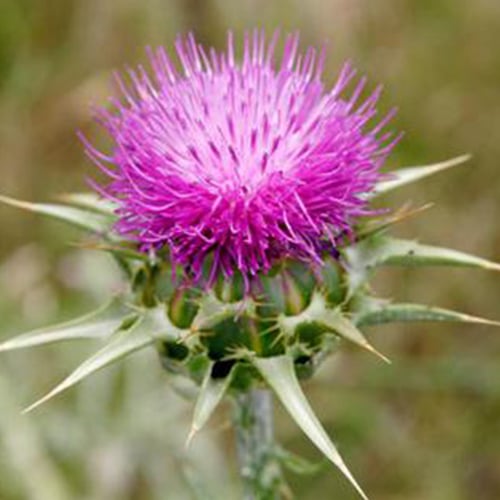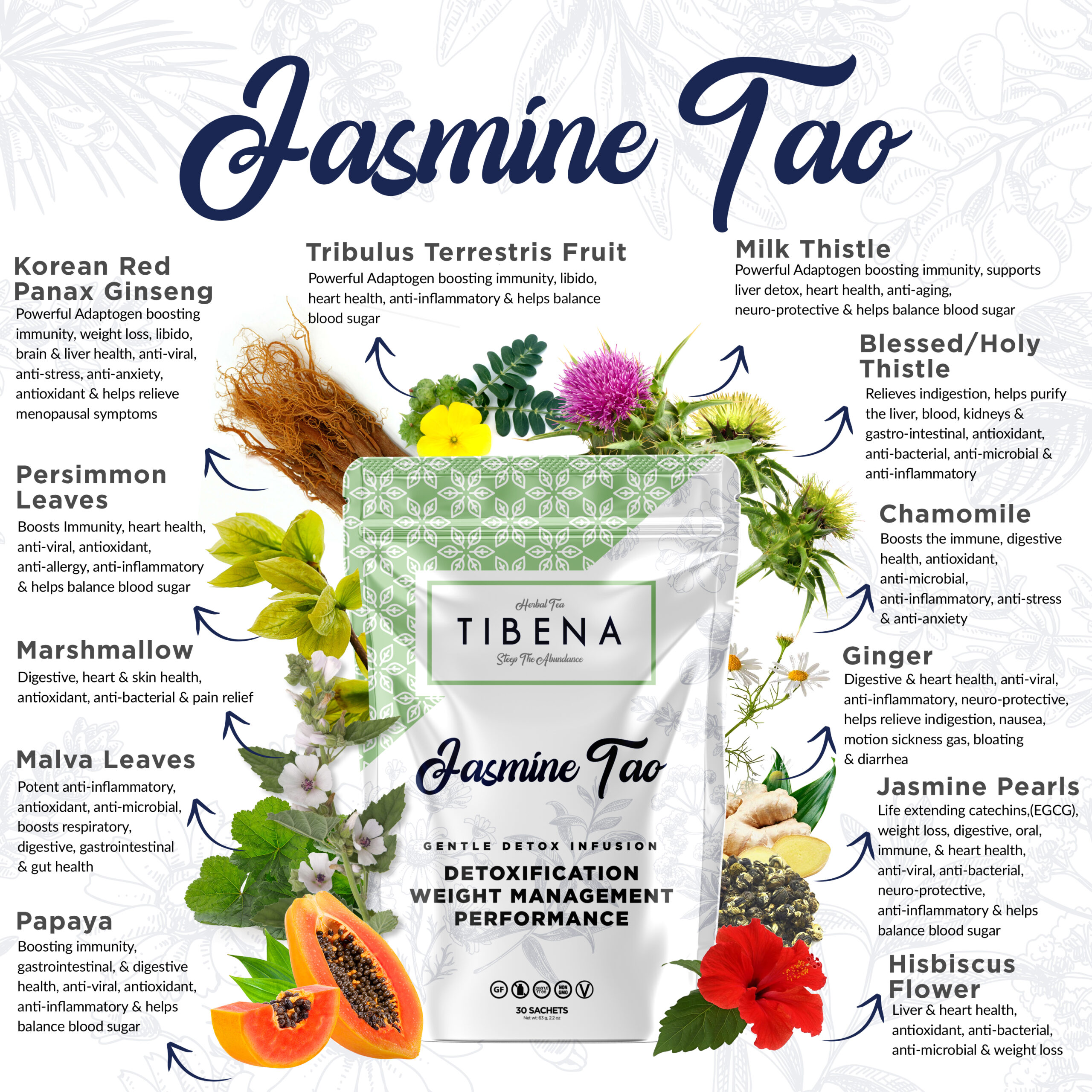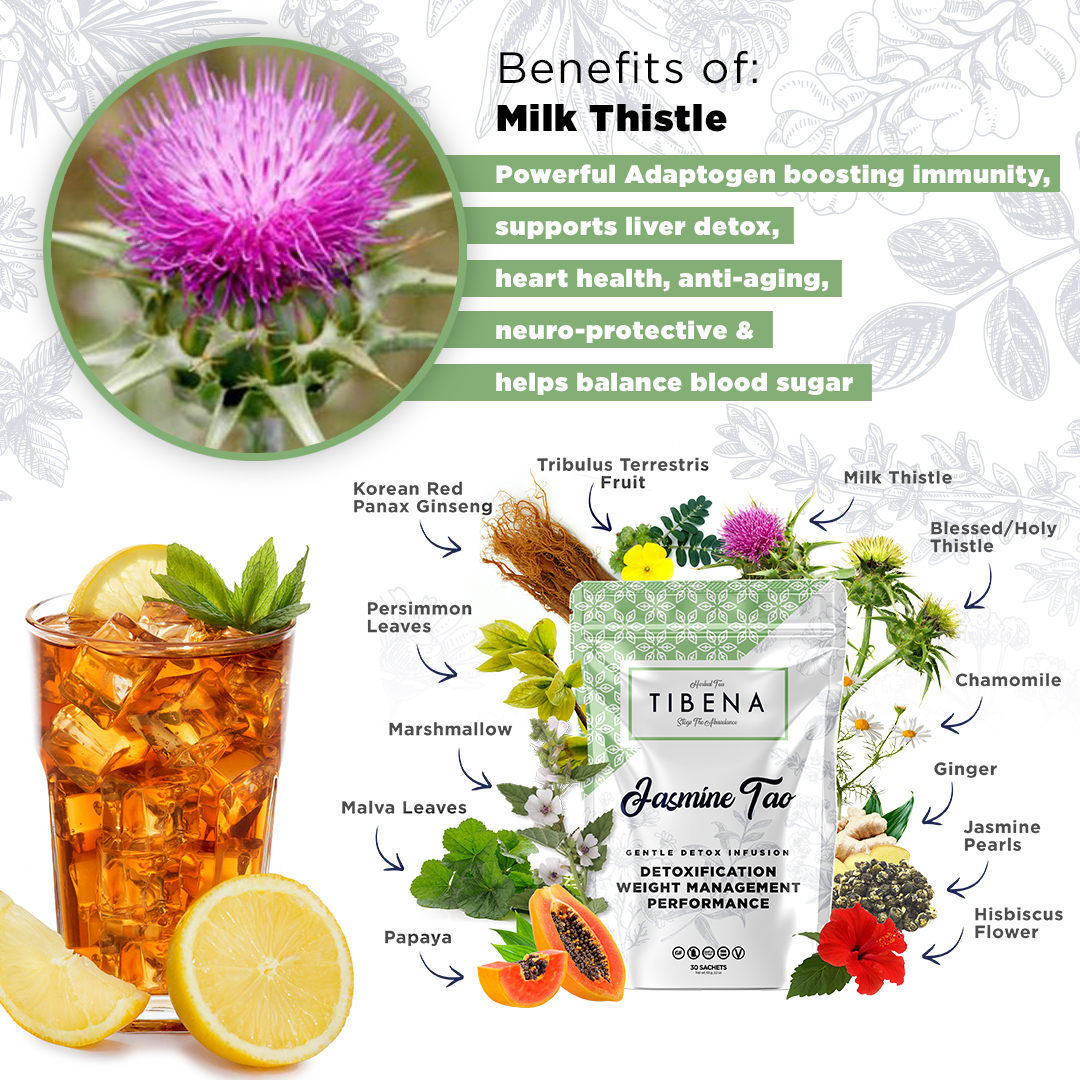
Studies have shown Potential Benefits:
Powerful adaptogen that boosts the immune, supports liver detox, heart health, anti-aging, neuro-protective, helps protect against cancer & helps balance blood sugar.
Milk Thistle
Powerful Adaptogen
Milk Thistle is derived from the milk thistle plant, also known as Silybum marianum. The active ingredients in milk thistle are a group of plant compounds collectively known as silymarin. Studies show silymarin increases glutathione levels. Glutathione is an antioxidant produced in cells. It’s comprised largely of three amino acids: glutamine, glycine, and cysteine. Glutathione levels in the body may be reduced by a number of factors, including poor nutrition, environmental toxins, and stress. Its levels also decline with age. Boosting glutathione provides many health benefits, including reduction of oxidative stress. Silymarin has been used to treat alcoholic liver disease, acute and chronic viral hepatitis and toxin-induced liver diseases. Silybum has powerfully protective and regenerative benefits on liver cells. The liver is implicated in many processes, and its failure induces severe consequences for metabolism, immune response, detoxification and antimicrobial defenses. Milk Thistle is an incredible liver detox. It helps cleanse the liver from previous damage due to pharmaceutical drugs, chemicals and environmental toxins. The milk thistle plant has been used for over 2,000 years. Greek physician and botanist Dioscorides described milk thistle’s healing properties back in the year 40 A.D.


https://www.ncbi.nlm.nih.gov/pubmed/20564545 – Safety & Liver Health
https://onlinelibrary.wiley.com/doi/abs/10.1002/ptr.3207 – Antioxidant for Liver Health
https://www.ncbi.nlm.nih.gov/pmc/articles/PMC6155865/ – Silymarrin (Milk Thistle) and Liver Health
https://www.ncbi.nlm.nih.gov/pubmed/27517806 – Liver Health
https://www.ncbi.nlm.nih.gov/pubmed/28025940 – Neuro-protective
https://www.ncbi.nlm.nih.gov/pubmed/23492971 – Antioxidant & Cyto-protection
https://www.ncbi.nlm.nih.gov/pubmed/24118806 – Neuro-protective
https://www.ncbi.nlm.nih.gov/pubmed/21071836 – Brain health
https://www.ncbi.nlm.nih.gov/pubmed/24460990 – A novel therapy for Alzheimer’s Disease
https://www.ncbi.nlm.nih.gov/pubmed/21185897 – A therapeutic agent for Alzheimer’s Disease
https://www.ncbi.nlm.nih.gov/pmc/articles/PMC4736801/ – Plant therapy for neuro-protection
https://www.ncbi.nlm.nih.gov/pubmed/23781510 – Potential protection for bone loss
https://www.ncbi.nlm.nih.gov/pubmed/24093748 – Potential protection therapy for bone loss
https://www.ncbi.nlm.nih.gov/pmc/articles/PMC4310066/ – Therapeutic potential in Diabetes
https://aasldpubs.onlinelibrary.wiley.com/doi/epdf/10.1002/cld.522 – Liver Health
https://www.ncbi.nlm.nih.gov/pubmed/18614420 – Powerful Antioxidant
https://www.ncbi.nlm.nih.gov/pubmed/21633595 – Treatment of Liver Disease
https://www.ncbi.nlm.nih.gov/pubmed/17201169 – Helps protect against cancer
https://www.ncbi.nlm.nih.gov/pubmed/11006131 – Helps protect against cancer
https://www.ncbi.nlm.nih.gov/books/NBK70118/ – May help lower high cholesterol
https://clinicaltrials.gov/ct2/show/results/NCT01265563?term=milk+thistle&spons=NCCIH&rank=4&view=results – May help control diabetes
https://www.ncbi.nlm.nih.gov/pubmed/17072885 – silymarin treatment in type II diabetic patients for 4 months has a beneficial effect on improving the glycemic profile – Helps control type II diabetes.
https://www.winchesterhospital.org/health-library/article?id=21817 – Milk Thistle studies
https://www.ncbi.nlm.nih.gov/pmc/articles/PMC2394725/ – Boosts Skin Health
https://www.ncbi.nlm.nih.gov/pubmed/25706757 – Anti-Aging Benefits
https://www.ncbi.nlm.nih.gov/pmc/articles/PMC4116427/ Milk Thistle Potential
https://www.ncbi.nlm.nih.gov/pubmed/26345246 – Skin Health
https://www.ncbi.nlm.nih.gov/pmc/articles/PMC5138577/ – Helps protect against cancer
https://pubmed.ncbi.nlm.nih.gov/20600218/- Potential protective agent for environmental contaminant induced immunotoxicity.
https://pubmed.ncbi.nlm.nih.gov/20579862/ – May be considered potentially in the treatment of diabetic nephropathy
https://pubmed.ncbi.nlm.nih.gov/1360480/ – Silymarin is able to maintain glutathione levels by preventing cell damage – It was concluded that silymarin can protect against acetaminophen (APAP) intoxication through its antioxidant properties, possibly acting as a free-radical scavenger.
